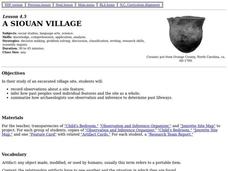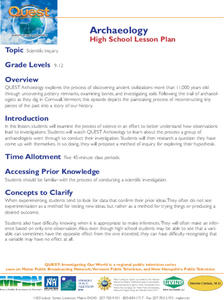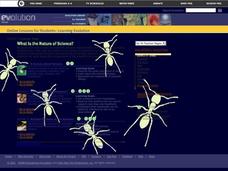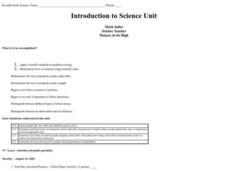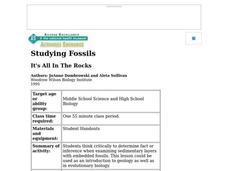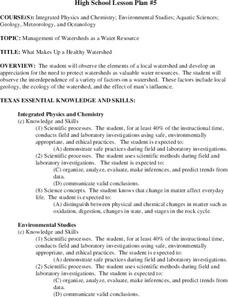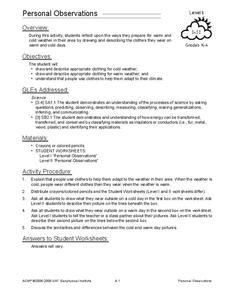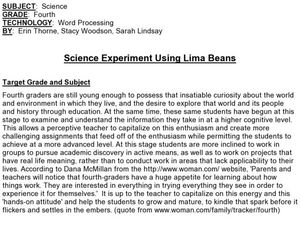NOAA
History's Thermometers
How is sea coral like a thermometer? Part three of a six-part series from NOAA describes how oceanographers can use coral growth to estimate water temperature over time. Life science pupils manipulate data to determine the age of corals...
NOAA
Journey to the Unknown
What's it like to be a deep-sea explorer? Tap into the imaginations of your fifth and sixth graders with a vivid activity, the second part of a six-part adventure. Learners close their eyes and submerge themselves in an expedition aboard...
Curated OER
Observing Sea Ice
Students study and observe types of sea ice found in Alaska. In this sea ice lesson, students use the student network for observing weather to study the different types of sea ice. Students study sea ice depicted in Alaskan art.
Curated OER
A Siouan Village
Fourth graders examine the artifacts obtained from an excavated Siouan village site. They make inferences about the people who once lived there based on the artifacts and complete a Research Team Report.
Curated OER
GROWING PLANTS UNIT
Students predict outcomes of scientific experiment,.conduct a scientific experiment with control groups, and plant seeds to observe, measure, and compare growth across groups. They gather, record, analyze, and share data with other...
Curated OER
Archaeology
Students examine how observations lead to investigations, and how archaeologists conduct their investigation.
NOAA
Watch the Screen!
Can a sponge cure cancer? Life science pupils visit the drugstore under the sea in the fifth activity of six. Working groups research the topic then get hands-on experience by testing the inhibiting effects of several plant extracts...
Curated OER
Crickets Guided Discovery
Sixth graders investigate insect anatomy by analyzing a live cricket. In this insect science lesson, 6th graders discuss their knowledge of insects and describe their characteristics from memory. Students observe live...
Curated OER
Weather Observation Journal
Students research weather patterns. For this weather lesson, students read Chester Noongwook's Rules of Weather Observation and keep a weather journal for one month. Students observe the weather patterns throughout the month.
NOAA
Off Base
How does carbon dioxide affect the world's oceans? The final installment in a series of six lessons has pupils research ocean acidification, then conduct an experiment to witness the delicate balance that exists in our seas. Materials...
California Academy of Science
Human Evolution
As the great and hilarious Tim Minchin once said, "Science is simply the word we use to describe a method of organizing our curiosity." Science is more than just a guess; it is based on questions, observations, and evidence. High...
Curated OER
What is the Nature of Science?
Students examine videos of field researach to discover the components of the scientific process. Using forms, they conduct community surveys about the nature of science. They research the extinction of dinosaurs and compare...
Curated OER
Caves
Explore caves with your class! Your scholars will participate in scientific observation, research, inference and deduction, reading, vocabulary, and writing activities about caves with this lesson plan. This resource contains five...
Curated OER
Not Just the Facts
Encourage your learners to explore the differences between hard news and news analysis. They outline a complex news analysis about the upcoming presidential election, then endeavor to write an analysis of the same topic, using local...
Curated OER
Theobroma - Food of the Gods
Students discuss the history of cacao and its use in the production of chocolate. They analyze actual cacao pods and record their observations. Finally they create a five minute contour drawing of the cacao pod and seeds.
Curated OER
Introduction to Science
Seventh graders investigate scientific methods to solve problems. They demonstrate creating data tables and graphs. They study the role of a scientist and the importance of safety in a science lab. They distinguish between an...
Curated OER
It's All in the Rocks
Students think critically to determine fact or inference when examining sedimentary layers with embedded fossils. They are being introduced to geology as well as evolutionary biology.
Curated OER
What Makes Up a Healthy Watershed
Students, after observing the elements of a local watershed, explore the need to protect watersheds as water resources for the future. They examine the factors involved with a watershed: geology, ecology, and the effect of man's...
Curated OER
Fertilizers, Pesticides and Human Health
Students define several vocabulary terms related to chemicals and toxicology. Students calculate chemical concentrations in water and explain the toxicological principles that govern safety of substances. Students conduct an...
Curated OER
Personal Observations
Pupils determine the appropriate clothing for warm and cold weather. In this weather and clothing lesson, students draw and describe appropriate clothing for cold and warm weather.
Curated OER
Classification of Animals
Middle schoolers explore animal characteristics by participating in a SMART board activity. In this animal classification lesson, students utilize a sorting chart to divide different animal names by their observable characteristics....
Curated OER
Growth of a Bean Documented by Child and Camera
Third graders photograph the growth of a bean plant and keep a daily written journal of observations. They drew, graphed and took notes on the plant growth which they compared to the photographic journal.
Curated OER
Experiences and Experiments - There is a Difference
Sixth graders plan and conduct an experiment on food spoilage. They design the experiment, create a display, record and analyze data, and make inferences regarding the results of the experiment.
Curated OER
Science Experiment Using Lima Beans
Fourth graders tie together elements about the world and their environment. Students incorporate styles of higher order thinking skills. Students measure skills of observations, conclusions, inferences and predictions.
Other popular searches
- Observation Inference
- Observation and Inference
- Observation Inference Lab
- Observation vs Inference
- Observation Inference Demo
- Observation vs. Inference
- Observation Inference Science



